14 Jan 2019 | Germany, Global Journalist, Media Freedom, News and features, Turkey, Turkey Uncensored
[vc_row][vc_column][vc_column_text]This article is part of Index on Censorship partner Global Journalist’s Project Exile series, which has published interviews with exiled journalists from around the world.[/vc_column_text][vc_column_text]
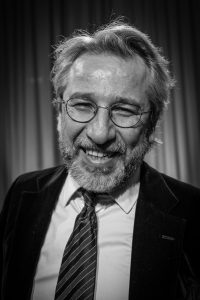
Can Dündar (Photo: Claude Truong Ngoc / Wikiepedia)
Can Dündar isn’t easily silenced.
The outspoken Turkish columnist and editor has been fired, jailed and even shot at by a would-be assassin for his coverage of President Recep Tayyip Erdogan’s government. He’s been forced into exile, blocked from seeing his wife and faced calls from Turkey’s pro-government media that he be abducted from his new home in Berlin.
“Exile, on the one hand, is a paradise for a journalist like me,” says Can Dündar, 57. “In Turkey it was hell: you are not allowed to write or talk. In Germany, at least I can write, I can talk, I can defend my colleagues. But of course, I am away from my country, my family and my paper. And there are lots of risks around. I’ve been taking those risks and trying to fight back.”
Dündar isn’t one to avoid risks during his 37 years as a journalist, TV anchor and author. Earlier in his career he wrote for Hürriyet, one of the country’s largest news outlets, before becoming a columnist with the daily Milliyet. Dündar was fired from the latter in 2013 after criticizing the response of Erdogan’s ruling AKP party to the massive anti-government protests that began in Istanbul’s Gezi Park.
But Dündar wasn’t done. He went on to become editor-in-chief of Cumhuriyet, a smaller newspaper that became increasingly critical of the government as Erdogan moved the country towards authoritarianism. In 2015, Cumhuriyet created a sensation by posting video footage online that it said showed Turkish intelligence forces transporting arms to opposition groups in Syria.
The report infuriated Erdogan, who labeled Dündar a traitor. Both Dündar and Cumhuriyet’s Ankara bureau chief, Erdem Gul were arrested and charged with espionage and ‘divulging state secrets.’ Dündar was interrogated for 11 hours before being taken to jail, where he was held 92 days, including 40 days in solitary confinement.
He was released to face trial, but on May 6, 2016, as Dündar awaited a verdict in his trial, a lone gunman approached him outside the courthouse and shot twice at him. The shots missed, and the gunman was wrestled away by a plain clothes policeman and Dündar’s wife. In video footage of the incident, the assailant is heard calling Dündar ‘a traitor’ – the exact the same words as Erdogan used to describe him.[/vc_column_text][vc_video link=”https://youtu.be/4YlDTDg2k1s”][vc_column_text]Dündar was sentenced to nearly six years in jail, but appealed his conviction. While on holiday overseas during the appeal in July 2016, members of the Turkish military launched a failed coup against Erdogan.
In the aftermath, Erdogan declared a state of emergency and began a sweeping crackdown against perceived political opponents and alleged supporters of a dissident cleric the government accused of inspiring the coup attempt. More than 160,000 people were arrested and 152,000 government workers were fired, according to the UN’s human rights office.
Among the arrested were 166 journalists, 75 of whom were convicted of various crimes, including coup-plotting and disseminating terrorism propaganda, according to the Stockholm Centre for Freedom. Thirteen of Dündar’s Cumhuriyet colleagues were charged in the purge.
All of this was enough for Dündar not to return to Turkey. Now living in Berlin, he divides his time between writing a column for the German newspaper Die Zeit, launching the startup Turkish news site Özgürüz and lecturing in Europe. A play based on his writings in jail called “We Are Arrested,” debuted in May at the Royal Shakespeare Company in the United Kingdom, just weeks after Turkey’s highest court ruled that Dündar’s jail sentence should be extended to 15 to 20 years.
Dündar spoke with Global Journalist’s Kris Croonen about harassment from pro-Erdogan Turks in Germany and Turkey’s diplomatic efforts to capture him. Below, an edited version of their interview:
Global Journalist: What made you decide not to return to Turkey?
Dündar: After the military coup attempt on July 15, 2016, the rule of law was lifted, and my lawyers warned me that under the state of emergency I would be in jail again and it won’t be that easy to get out this time.
The first thing they had done was arrest the high [court] judges who had decided for our release previously. They are all in jail, still.
So it was a kind of a coup d’etat by Erdogan. I also consulted my colleagues, my family, and everybody advised me not to come back. Of course it was not an easy decision because I went on a holiday just with a suitcase full of books and nothing else.
So I stayed in Europe,without anything. First I traveled in different countries: to London, to Paris and Berlin…but I realized that Berlin was the best option because there was a huge interest about Turkey in Germany. I got an offer from Die Zeit to write a regular column for them, and PEN/Germany offered me a scholarship. So I decided to stay here.
GJ: The Turkish community in Germany is about 3 million people – and many are fervent supporters of Erdogan. Isn’t Germany a little bit unsafe for you?
Dündar: Not “a little bit.” It’s really the most dangerous place on Earth for someone like me [laughs]. In the beginning, I was not aware of the risks. But then I realized immediately, and it’s still a problem.
GJ: Do you encounter real danger in Berlin from pro-government Turks?
Dündar: Yeah, that’s daily business. They attack, they come to annoy you, they insult you…That kind of stuff. But it’s nothing different than Turkey, you know, you get used to this always facing risks. It’s not new for me. I just have to be careful. And if I do something in public, the German police normally comes and protects me.
GJ: When did you realize that your wife wouldn’t be able to join you?
Dündar: Immediately after I arrived in Berlin, I called her. The day after she was about to come to me but she was stopped at the airport…without any reason. They took her passport and confiscated it. First they said her passport is not reading on the computer. Then they said it’s lost, although she had it in her pocket.
Shortly after, they published a kind of decree saying that if someone is being blamed for terrorist acts, their family members may also be banned from travel. For the Turkish government, I am a terrorist. Everybody challenging the government is a terrorist. So it’s two and half years now that we are living separately…She can’t travel…it’s tough, really, it’s a kind of punishment. She’s held like a hostage.
GJ: When Erdogan came to Germany in September, he threatened to stay away from a press conference if you would be there. In the end, you were the one who decided not to show up. Why did you give in?
Dündar: That’s correct. Mr. Erdogan said, “It’s me or him.” I decided that a journalist should not be the subject of the news, he should be the writer of the news…On the other hand, what was important is asking questions. So I gave my questions to my German colleagues and they asked them. Everybody understood what kind of politician we are dealing with and how he’s scared of journalists and questions.
GJ: Do you still think it’s been worth the sacrifice?
Dündar: Yes, because we are not only defending a profession, we also have to save our country. It’s a high price we are paying. But the alternative is losing the country. So we have to do everything we can. I feel responsible for my son [who lives in the U.K.], I want him to be able to live in a free country. I have to do my best and this is the least that I can do: writing as a journalist and talking.
GJ: Do you still hope to be able to return to Turkey?
Dündar: In the short term, it will be painful, but we are coming to the end of it. After sixteen years of power, now Erdogan is facing [his] most difficult period of time, at least economically. So we will see the consequences. [/vc_column_text][/vc_column][/vc_row][vc_row][vc_column width=”1/2″][vc_video link=”https://youtu.be/6BIZ7b0m-08″][/vc_column][vc_column width=”1/2″][vc_column_text]Index on Censorship partner Global Journalist is a website that features global press freedom and international news stories as well as a weekly radio program that airs on KBIA, mid-Missouri’s NPR affiliate, and partner stations in six other states. The website and radio show are produced jointly by professional staff and student journalists at the University of Missouri’s School of Journalism, the oldest school of journalism in the United States. [/vc_column_text][/vc_column][/vc_row][vc_row][vc_column][vc_custom_heading text=”Don’t lose your voice. Stay informed.” use_theme_fonts=”yes”][vc_separator color=”black”][vc_row_inner][vc_column_inner width=”1/2″][vc_column_text]Index on Censorship is a nonprofit that campaigns for and defends free expression worldwide. We publish work by censored writers and artists, promote debate, and monitor threats to free speech. We believe that everyone should be free to express themselves without fear of harm or persecution – no matter what their views.
Join our mailing list (or follow us on Twitter or Facebook). We’ll send you our weekly newsletter, our monthly events update and periodic updates about our activities defending free speech. We won’t share, sell or transfer your personal information to anyone outside Index.[/vc_column_text][/vc_column_inner][vc_column_inner width=”1/2″][gravityform id=”20″ title=”false” description=”false” ajax=”false”][/vc_column_inner][/vc_row_inner][/vc_column][/vc_row][vc_row full_width=”stretch_row_content”][vc_column][three_column_post title=”Global Journalist / Project Exile” full_width_heading=”true” category_id=”22142″][/vc_column][/vc_row]
6 Aug 2018 | Global Journalist, Mapping Media Freedom, Media Freedom, media freedom featured, News and features, Turkey, Turkey Uncensored
[vc_row][vc_column][vc_column_text]
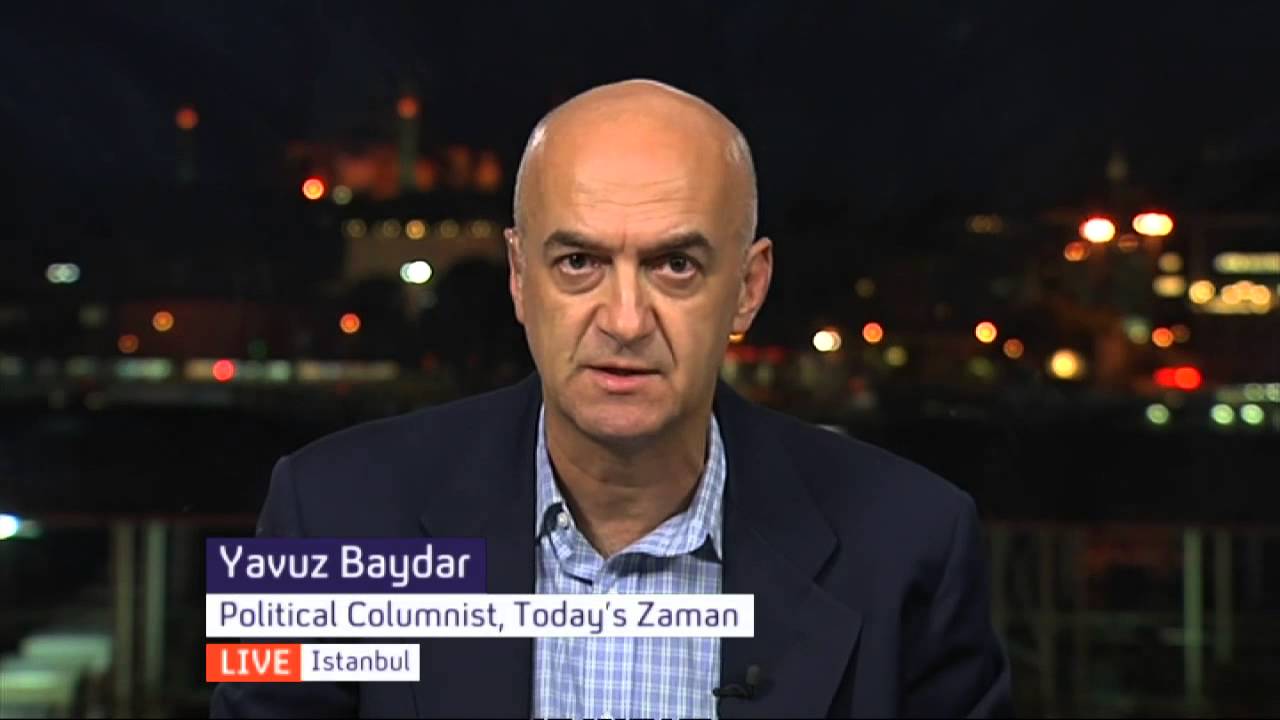
Yavuz Baydar (YouTube)
It’s 2016. Turkey is in a state of emergency after the failed coup against the government of President Recep Tayyip Erdoğan. Journalists like Yavuz Baydar found themselves more at risk than ever before. He had a decision to make: leave Turkey while he still could, or stay and potentially become part of the more than 160,000 journalists, protesters, dissidents and political pundits have since been jailed.
Baydar is an accomplished journalist with a career that spans four decades. In addition to his journalism roles, he was a co-founder of the non-profit P24, Platform for Independent Journalism which acts as an example of editorial independence in the Turkish press. He is the recipient of the 2014 Special Award of the European Press Prize (EPP) for excellence in journalism and in the same year completed an extensive research paper on self-censorship, corruption of ownership in Turkish media, state oppression and threats over journalism in Turkey during his Shorenstein Fellow at Harvard Kennedy School of Government. In 2017 he was awarded the Morris B Abram Human Rights Award by UN Watch. He has worked with Süddeutsche Zeitung, the Guardian, Huffington Post, Al Jazeera, The New York Times, and Index on Censorship, even his regular opinion columns for the Turkish dailies Today’s Zaman, Bugün and Özgür Düşünce. In early February 2018, Baydar was awarded the prestigious ‘Journalistenpreis’ by the Munich-based SüdostEuropa Gesellschaft.
He decided to leave Turkey for France.
Two years later on 25 June 2018, Erdoğan was re-elected president with 53% of the ballot to his closest rival Muharrem Ince’s 31%. Under Turkey’s new constitution, Erdoğan has been given autocratic powers that enable him to appoint ministers and vice-presidents, call for a state of emergency and intervene directly in the rule of law.
He keeps in touch with the status of press freedom in Turkey in his ‘Gazette’ which acts as a hosting site for curated links to the news articles of the day. In his latest endeavor, Baydar is in managing editor at Ahval. He took some time to answer some questions from Index on Censorship’s Nicole Ntim-Addae.
Index: What makes you such an ardent supporter of media freedom?
Baydar: My education. I had the great chance of being enrolled at the prestigious School of Journalism at Stockholm University. It was a wonderfully open and generous environment. There, as our dean used to say, ‘we learned the basics of the social role of the profession’. We learned how much bravery it demands. It taught us to be free of any dogma, and act fearlessly against the holders of power. I owe a lot to the school, but also to Swedish Radio and TV Corporation. Then, also the BBC World Service was important for the formation.
Index: Where were you when you made the decision to leave? What was the trigger?
Baydar: I was at home. It was a very intense night. And in the morning, after a short sleep, I assessed the situation and concluded that no matter with the outcome of the putsch, we the journalists would be declared the scapegoats and forced to pay the price. In any case, already then, Turkey had turned into hell for journalism.
Index: How is France different than Turkey? Do you feel settled there?
Baydar: Excellent environment, has always been for its commitment to freedom. It was perhaps there for the so called Young Turks, who were at the opposition to Sultan 120 years ago, had settled there. As I am now.
Index: What does you hope for Ahval to accomplish?
Baydar: Good, honest journalism. Strong coverage for facts, especially economy. That it accurately, fairly informs Turkish readers, who are stripped of independent sources. Also the international audience gets a comprehensive picture of the reality in the country. Our backbone is the critical minds. We are not an opposition outlet; we are critical. It is the essence of journalism.
Index: How difficult has it been to be away from home?
Baydar: For me, not much. I lived abroad long enough, so I am accustomed to it. For some of the staff, it may be difficult, because many of them experience the exile for the first time.
Index: Considering that Erdoğan won the election, and was awarded additional powers by and was awarded additional powers by the referendum, safe to return home soon?
Baydar: No. It is an unfree environment. Has no space for independent criticism. And the rule of law has been suspended over there. We will have to wait some time, before conditions change.[/vc_column_text][/vc_column][/vc_row][vc_row][vc_column width=”1/4″][vc_column_text]
[/vc_column_text][/vc_column][vc_column width=”3/4″][vc_column_text]
Media freedom is under threat worldwide. Journalists are threatened, jailed and even killed simply for doing their job.
Index on Censorship documents threats to media freedom in Europe through a monitoring project and campaigns against laws that stifle journalists’ work. We also publish an award-winning magazine featuring work by and about censored journalists.
Learn more about our work to protect press freedom.[/vc_column_text][/vc_column][/vc_row][vc_row full_width=”stretch_row_content”][vc_column][three_column_post title=”Global Journalist / Project Exile” full_width_heading=”true” category_id=”22142″][/vc_column][/vc_row]
24 Jul 2017 | Mapping Media Freedom, Media Freedom, media freedom featured, News and features, Turkey, Turkey Uncensored
[vc_row][vc_column][vc_column_text]
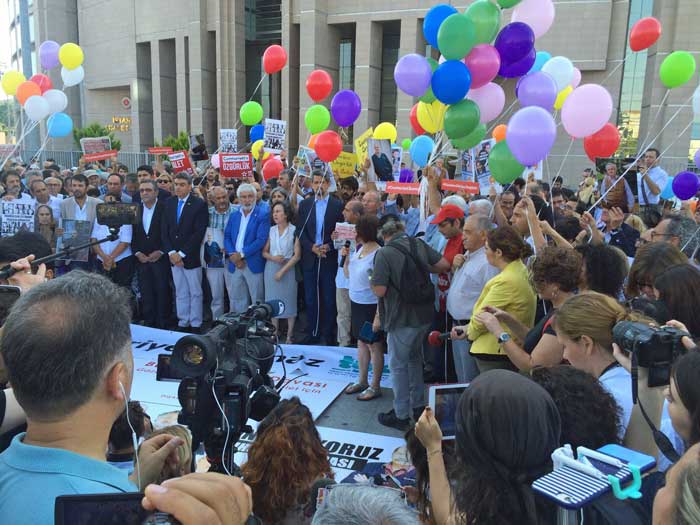
People gather in support of the Cumhuriyet defendants as the trial got underway.
Executives and columnists of Turkey’s critical Cumhuriyet daily go on trial this week, beginning Monday 24 July. The indictment seeks prison sentences for the defendants varying between 7.5 to 43 years. The charges for those on the board of the Cumhuriyet Foundation, which oversees the newspaper, include “abuse of power in office,” but all are accused of “supporting terrorist organisations” mainly through changes that have occurred in the paper’s editorial policy following the election of a new board to the foundation in 2013.
The prosecution’s claims are supported by views of several media experts — most of whom are former executives or employees terminated from various positions, according to Aydın Engin, a Cumhuriyet columnist who is also a defendant in the case although he was released pending trial due to his advanced age.
As Engin says “Cumhuriyet changed its editorial policy: this is the essence of the indictment.”
Indeed, the 435-page long document laments, page after page, that Cumhuriyet ditched its traditional, Kemalist, unyieldingly secularist and statist editorial policy and became a more open-minded newspaper.
The prosecutor states that by altering its editorial stance, the newspaper became a supporter of the so-called Fethullahist Terrorist Organization (FETÖ/PYD) — the name Turkish authorities give to the Fethullah Gülen network, which they say was behind last year’s coup attempt –, the Kurdistan Workers’ Party (PKK/KCK) and the Revolutionary People’s Liberation Party/Front (DHKP-C); three organizations with unrelated if not completely opposing worldviews.
“A newspaper changing its editorial policy cannot possibly be the subject of an indictment,” Engin says.
But did Cumhuriyet really change its editorial policy to legitimise the actions of FETÖ/PDY; PKK/KCK and DHKP/C as the prosecutor claims? “Every newspaper makes editorial policy changes as life unfolds. Cumhuriyet also did this. The paper caught up with the general tendencies in society such as increasing demand for freedoms, human rights and a stronger civil society.”
Engin says many of the witnesses who have testified against the Cumhuriyet journalists have been discredited as media professionals. “When I told the prosecutor that I will not respond to claims by people who have no reputation as journalists, he showed me a post by Professor Halil Berktay, who tweeted that ‘Cumhruiyet has become FETÖ’s media outlet.’ The prosecutor said, ‘This from a professor. Who are you to deny its validity?’
Engin: old and tired
Will any of the Cumhuriyet journalists be released at the end of this week? “I don’t even want to being to make any assumptions. This is not a legal trial; it is entirely political,” Engin replies, adding: “I strongly need them, personally, because I am 76 and tired,” says the energetic-looking journalist, who, as he speaks, is interrupted by someone asking him to sign a financial document. “See, I don’t even know what I just signed, I don’t know anything about these things.”
According to Engin, because those imprisoned are the key people to the newspaper’s operations, Cumhuriyet is now “half-paralyzed.”
But really, who are those in prison?
“Our brightest colleagues are in the can. Akın Atalay, is our CEO and I am a first-hand witness of how he has managed to keep the newspaper on its feet. Murat Sabuncu, he is perhaps one of the two or three finest journalists I know who can smell the news. He is publicly unheard of but Önder Çelik: he has been with Cumhuriyet for 35 years, he is the finest expert at things such as analyzing circulation reports, maintaining relations with printing houses; following paper prices..”
“I really need them to get out, but I don’t want to be dreaming.”[/vc_column_text][vc_row_inner][vc_column_inner][vc_separator color=”black”][/vc_column_inner][/vc_row_inner][vc_row_inner][vc_column_inner width=”1/2″][vc_custom_heading text=”Turkey” font_container=”tag:p|font_size:30|text_align:left” use_theme_fonts=”yes” link=”url:https%3A%2F%2Fmappingmediafreedom.org%2F|||”][vc_column_text]Index on Censorship monitors press freedom in Turkey and 41 other European area nations.
As of 24/07/2017, there were 496 verified reports of media freedom violations associated with Turkey in the Mapping Media Freedom database.[/vc_column_text][/vc_column_inner][vc_column_inner width=”1/2″][vc_single_image image=”94623″ img_size=”full” onclick=”custom_link” link=”https://mappingmediafreedom.org/#/”][/vc_column_inner][/vc_row_inner][vc_row_inner][vc_column_inner][vc_separator color=”black”][/vc_column_inner][/vc_row_inner][vc_row_inner][vc_column_inner][vc_column_text]The journalists on trial for the first time on 24 – 28 July:
 Akın Atalay (Cumhuriyet Foundation Executive President; imprisoned since Nov. 12, 2016): Facing 11 to 43 years in prison for “helping a terrorist organisation while not being a member” and “abusing trust”
Akın Atalay (Cumhuriyet Foundation Executive President; imprisoned since Nov. 12, 2016): Facing 11 to 43 years in prison for “helping a terrorist organisation while not being a member” and “abusing trust”
Atalay graduated from İstanbul University Law School in 1985. He has acted as the founding member of a number of civil society organisations and his academic studies on press freedom and the law have appeared in a large number of academic journals and newspapers. Since 1993, he has represented Cumhuriyet columnists and reporters as legal counsel. Currently, he is the newspaper’s executive president.
 Bülent Utku (Cumhuriyet Foundation Board Member, attorney representing Cumhuriyet; imprisoned since Nov. 5, 2016). Facing 9.5 to 29 years in prison for “helping a terrorist organisation while not being a member” and “abusing trust”
Bülent Utku (Cumhuriyet Foundation Board Member, attorney representing Cumhuriyet; imprisoned since Nov. 5, 2016). Facing 9.5 to 29 years in prison for “helping a terrorist organisation while not being a member” and “abusing trust”
Utku has worked as an attorney for 33 years. Since 1993, he has worked as a lawyer for Cumhuriyet columnists and journalists. He is also a member of the Cumhuriyet Foundation’s Board of Directors.
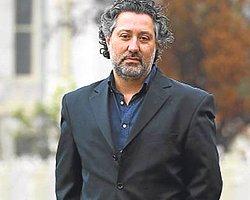 Murat Sabuncu (editor-in-chief, imprisoned since Nov. 5). Facing 7.5 to 15 years in prison for “helping a terrorist organisation while not being a member” [Turkish Penal Code (TCK) Article 314/2]
Murat Sabuncu (editor-in-chief, imprisoned since Nov. 5). Facing 7.5 to 15 years in prison for “helping a terrorist organisation while not being a member” [Turkish Penal Code (TCK) Article 314/2]
Sabuncu has been a journalist for 20 years. He started working at Cumhuriyet in 2014 as the newsroom coordinator. In July 2016, he took the helm as editor-in-chief.
 Kadri Gürsel (publications advisor, columnist, imprisoned since Nov. 5, 2015). Facing 7.5 to 15 years in prison for “helping a terrorist organisation while not being a member”
Kadri Gürsel (publications advisor, columnist, imprisoned since Nov. 5, 2015). Facing 7.5 to 15 years in prison for “helping a terrorist organisation while not being a member”
A journalist of 28 years, Gürsel started writing columns in Cumhuriyet in May 2016. He assumed the position of publications advisor for the newspaper in September 2016.
 Güray Öz (board member, news ombudsman, columnist, imprisoned since Nov. 5, 2015). Facing 8.5 to 22 years in prison for “helping a terrorist organisation while not being a member” and a single count of “abuse of power in office”
Güray Öz (board member, news ombudsman, columnist, imprisoned since Nov. 5, 2015). Facing 8.5 to 22 years in prison for “helping a terrorist organisation while not being a member” and a single count of “abuse of power in office”
Öz has been a journalist for 21 years. He has worked at Cumhuriyet since 2006. He is a columnist for the newspaper and has been its ombudsman since 2013. Öz is also on the board of directors of the Cumhuriyet Foundation.
 Önder Çelik (board member, imprisoned since Nov. 5, 2016). Facing 11.5 to 43 years in prison for “helping a terrorist organisation while not being a member” and four counts of “abuse of power in office”
Önder Çelik (board member, imprisoned since Nov. 5, 2016). Facing 11.5 to 43 years in prison for “helping a terrorist organisation while not being a member” and four counts of “abuse of power in office”
Önder Çelik has been a newspaper administrator for 35 years. He has worked as the print coordinator for the newspaper between 1981 – 1998. He returned to the same position in 2002 after a hiatus. He has been an executive board member since 2014 as well as a board member of the foundation.
 Turhan Günay (editor-in-chief of Cumhuriyet’s book supplement, imprisoned since Nov. 5, 2016). Facing 8.5 to 22 years for “helping a terrorist organisation while not being a member” and a single count of “abuse of power in office”
Turhan Günay (editor-in-chief of Cumhuriyet’s book supplement, imprisoned since Nov. 5, 2016). Facing 8.5 to 22 years for “helping a terrorist organisation while not being a member” and a single count of “abuse of power in office”
A journalist for 48 years, Günay has been with Cumhuriyet since 1987. For the past 25 years, he has worked as the chief editor for Cumhuriyet’s literary supplement, the country’s longest running weekly publication on books. The indictment insists he is a board member of the foundation; although he isn’t; a fact he reiterated in his testimony to the prosecutor.
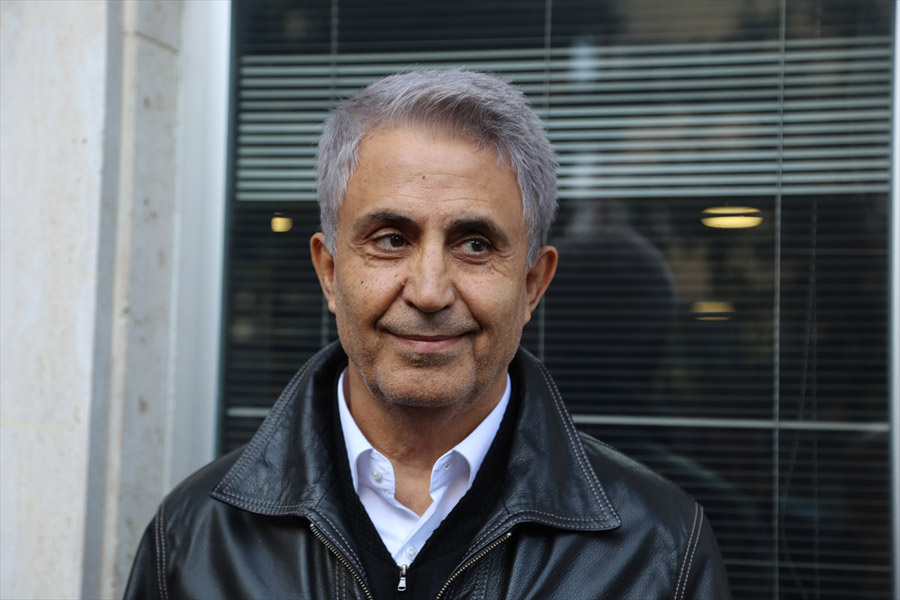
Musa Kart
Musa Kart (Cartoonist, board member, imprisoned since Nov. 5, 2016) Facing 9.5 to 29 years in prison for “helping a terrorist organisation while not being a member” and “abusing trust”
Musa Kart, one of Turkey’s most renowned cartoonists, has been drawing political cartoons for 33 years. He has been a Cumhuriyet journalist since 1985. For the past six years, Kart has drawn the front-page cartoons for Cumhuriyet.
 Hakan Karasinir (board member, imprisoned since Nov. 5). Facing 9.5 to 29 years in prison for “helping a terrorist organisation while not being a member” and two counts of “abuse of power in office”
Hakan Karasinir (board member, imprisoned since Nov. 5). Facing 9.5 to 29 years in prison for “helping a terrorist organisation while not being a member” and two counts of “abuse of power in office”
Hakan Karasinir has been a journalist for 34 years. He has been with Cumhuriyet for 34 years. In the past he has held various editorial positions, including serving as the newspaper’s managing editor between 1994 and 2014. Since 2014, he has also written columns in the newspaper.
 Mustafa Kemal Güngör (attorney, board member, imprisoned since Nov. 5, 2016). Facing 9.5 to 29 years in prison for “helping a terrorist organisation while not being a member”; two counts of “abuse of power in office”
Mustafa Kemal Güngör (attorney, board member, imprisoned since Nov. 5, 2016). Facing 9.5 to 29 years in prison for “helping a terrorist organisation while not being a member”; two counts of “abuse of power in office”
Mustafa Kemal Güngör has been a lawyer for 31 years. He has defended Cumhuriyet journalists and columnists in court since 2013.

Can Dundar
Can Dündar (former editor-in-chief of Cumhuriyet, currently resides abroad). Facing 7.5 to 15 years for “helping a terrorist organisation while not being a member”
Perhaps the most internationally famous of all Cumhuriyet defendants, Can Dündar was the editor-in-chief of Cumhuriyet until August 2016. He was arrested in November 2015 after Cumhuriyet published footage suggesting that the Turkish government sent weapons to armed jihadi groups in Syria. He was released in February 2016, a few months after which he moved to Germany where he currently resides.
 Orhan Erinç (Cumhuriyet Foundation Board President, columnist). Facing 11.5 to 43 years in prison for “helping a terrorist organization while not being a member” ; four counts of “abuse of power in office”
Orhan Erinç (Cumhuriyet Foundation Board President, columnist). Facing 11.5 to 43 years in prison for “helping a terrorist organization while not being a member” ; four counts of “abuse of power in office”
Veteran journalist Orhan Erinç, who worked for Cumhuriyet as a young reporter, returned to the newspaper in 1993 as its publications advisor. For nearly half a decade, Erinç also held the position of vice president at Turkish Journalists’ Association. He is also a columnist for Cumhuriyet.
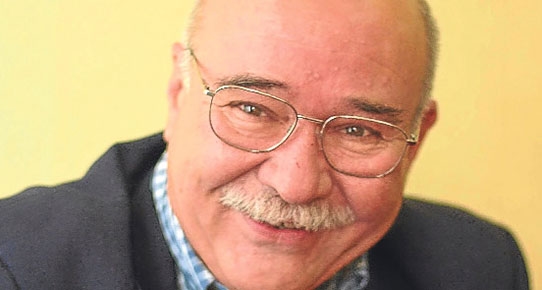 Aydın Engin (columnist, released under judicial control measures). Facing 7.5 to 15 years in prison for “helping a terrorist organization while not being a member”
Aydın Engin (columnist, released under judicial control measures). Facing 7.5 to 15 years in prison for “helping a terrorist organization while not being a member”
Cumhuriyet columnist Aydın Engin has been a journalist since 1969. He has participated in the founding process for many news outlets, including Turkey’s Birgün daily. He worked as a columnist and reporter for Cumhuriyet between 1992 and 2002. He returned to the newspaper in 2015.
 Hikmet Çetinkaya (columnist, board member, released under judicial control). Facing 9.5 to 29 years in prison for “helping a terrorist organisation while not being a member”; two counts of “abuse of power in office”
Hikmet Çetinkaya (columnist, board member, released under judicial control). Facing 9.5 to 29 years in prison for “helping a terrorist organisation while not being a member”; two counts of “abuse of power in office”
Çetinkaya has been with Cumhuriyet for three decades. In the past, the columnist worked as the İzmir Bureau Chief of the newspaper. He was also tried in 2015 along with Cumhuriyet columnist Ceyda Karan for reprinting the Charlie Hebdo cartoons in his column.
 Ahmet Şık (Correspondent, imprisoned since Dec. 30, 2016). Facing 7.5 to 15 years in prison for “helping a terrorist organisation while not being a member”
Ahmet Şık (Correspondent, imprisoned since Dec. 30, 2016). Facing 7.5 to 15 years in prison for “helping a terrorist organisation while not being a member”
No stranger to Turkish prisons, Ahmet Şık worked as a reporter for Cumhuriyret, Evrensel, Yeni Yüzyıl, Nokta and Reuters between 1991 and 2007. He remained in prison for a year in 2011 in an investigation about a shady gang called Ergenekon, believed to be nested within Turkey’s state hierarchy. He is known as one of the most vocal critics of the Fethullah Gülen network.
 İlhan Tanır (former Washington correspondent, resides abroad). Facing 7.5 to 15 years in prison for “helping a terrorist organisation while not being a member”
İlhan Tanır (former Washington correspondent, resides abroad). Facing 7.5 to 15 years in prison for “helping a terrorist organisation while not being a member”
İlhan Tanır previously reported from Washington for Cumhuriyet. His reports and analyses have appeared in many national and international publications. He currently resides in the United States.
 Bülent Yener (Finance Manager). Facing 7.5 to 15 years in prison for “helping a terrorist organization while not being a member”
Bülent Yener (Finance Manager). Facing 7.5 to 15 years in prison for “helping a terrorist organization while not being a member”
A former financial affairs manager with Cumhuriyet, Bülent Yener was released after one day in custody.
Günseli Özaltay (Accounting Manager). Facing 7.5 to 15 years in prison for “helping a terrorist organization while not being a member”
Günseli Özaltay, the newspaper’s accounting manager, was released after one day in custody.[/vc_column_text][/vc_column_inner][/vc_row_inner][vc_basic_grid post_type=”post” max_items=”12″ style=”load-more” items_per_page=”4″ element_width=”6″ grid_id=”vc_gid:1500894514864-6349d62e-4ed7-3″ taxonomies=”8607″][/vc_column][/vc_row]




 Akın Atalay (Cumhuriyet Foundation Executive President; imprisoned since Nov. 12, 2016): Facing 11 to 43 years in prison for “helping a terrorist organisation while not being a member” and “abusing trust”
Akın Atalay (Cumhuriyet Foundation Executive President; imprisoned since Nov. 12, 2016): Facing 11 to 43 years in prison for “helping a terrorist organisation while not being a member” and “abusing trust” Bülent Utku (Cumhuriyet Foundation Board Member, attorney representing Cumhuriyet; imprisoned since Nov. 5, 2016). Facing 9.5 to 29 years in prison for “helping a terrorist organisation while not being a member” and “abusing trust”
Bülent Utku (Cumhuriyet Foundation Board Member, attorney representing Cumhuriyet; imprisoned since Nov. 5, 2016). Facing 9.5 to 29 years in prison for “helping a terrorist organisation while not being a member” and “abusing trust” Murat Sabuncu (editor-in-chief, imprisoned since Nov. 5). Facing 7.5 to 15 years in prison for “helping a terrorist organisation while not being a member” [Turkish Penal Code (TCK) Article 314/2]
Murat Sabuncu (editor-in-chief, imprisoned since Nov. 5). Facing 7.5 to 15 years in prison for “helping a terrorist organisation while not being a member” [Turkish Penal Code (TCK) Article 314/2] Kadri Gürsel (publications advisor, columnist, imprisoned since Nov. 5, 2015). Facing 7.5 to 15 years in prison for “helping a terrorist organisation while not being a member”
Kadri Gürsel (publications advisor, columnist, imprisoned since Nov. 5, 2015). Facing 7.5 to 15 years in prison for “helping a terrorist organisation while not being a member”  Güray Öz (board member, news ombudsman, columnist, imprisoned since Nov. 5, 2015). Facing 8.5 to 22 years in prison for “helping a terrorist organisation while not being a member” and a single count of “abuse of power in office”
Güray Öz (board member, news ombudsman, columnist, imprisoned since Nov. 5, 2015). Facing 8.5 to 22 years in prison for “helping a terrorist organisation while not being a member” and a single count of “abuse of power in office”  Önder Çelik (board member, imprisoned since Nov. 5, 2016). Facing 11.5 to 43 years in prison for “helping a terrorist organisation while not being a member” and four counts of “abuse of power in office”
Önder Çelik (board member, imprisoned since Nov. 5, 2016). Facing 11.5 to 43 years in prison for “helping a terrorist organisation while not being a member” and four counts of “abuse of power in office”  Turhan Günay (editor-in-chief of Cumhuriyet’s book supplement, imprisoned since Nov. 5, 2016). Facing 8.5 to 22 years for “helping a terrorist organisation while not being a member” and a single count of “abuse of power in office”
Turhan Günay (editor-in-chief of Cumhuriyet’s book supplement, imprisoned since Nov. 5, 2016). Facing 8.5 to 22 years for “helping a terrorist organisation while not being a member” and a single count of “abuse of power in office” 
 Hakan Karasinir (board member, imprisoned since Nov. 5). Facing 9.5 to 29 years in prison for “helping a terrorist organisation while not being a member” and two counts of “abuse of power in office”
Hakan Karasinir (board member, imprisoned since Nov. 5). Facing 9.5 to 29 years in prison for “helping a terrorist organisation while not being a member” and two counts of “abuse of power in office” 
 Orhan Erinç (Cumhuriyet Foundation Board President, columnist). Facing 11.5 to 43 years in prison for “helping a terrorist organization while not being a member” ; four counts of “abuse of power in office”
Orhan Erinç (Cumhuriyet Foundation Board President, columnist). Facing 11.5 to 43 years in prison for “helping a terrorist organization while not being a member” ; four counts of “abuse of power in office”  Aydın Engin (columnist, released under judicial control measures). Facing 7.5 to 15 years in prison for “helping a terrorist organization while not being a member”
Aydın Engin (columnist, released under judicial control measures). Facing 7.5 to 15 years in prison for “helping a terrorist organization while not being a member”  Hikmet Çetinkaya (columnist, board member, released under judicial control). Facing 9.5 to 29 years in prison for “helping a terrorist organisation while not being a member”; two counts of “abuse of power in office”
Hikmet Çetinkaya (columnist, board member, released under judicial control). Facing 9.5 to 29 years in prison for “helping a terrorist organisation while not being a member”; two counts of “abuse of power in office”  Ahmet Şık (Correspondent, imprisoned since Dec. 30, 2016). Facing 7.5 to 15 years in prison for “helping a terrorist organisation while not being a member”
Ahmet Şık (Correspondent, imprisoned since Dec. 30, 2016). Facing 7.5 to 15 years in prison for “helping a terrorist organisation while not being a member”  İlhan Tanır (former Washington correspondent, resides abroad). Facing 7.5 to 15 years in prison for “helping a terrorist organisation while not being a member”
İlhan Tanır (former Washington correspondent, resides abroad). Facing 7.5 to 15 years in prison for “helping a terrorist organisation while not being a member”  Bülent Yener (Finance Manager). Facing 7.5 to 15 years in prison for “helping a terrorist organization while not being a member”
Bülent Yener (Finance Manager). Facing 7.5 to 15 years in prison for “helping a terrorist organization while not being a member”